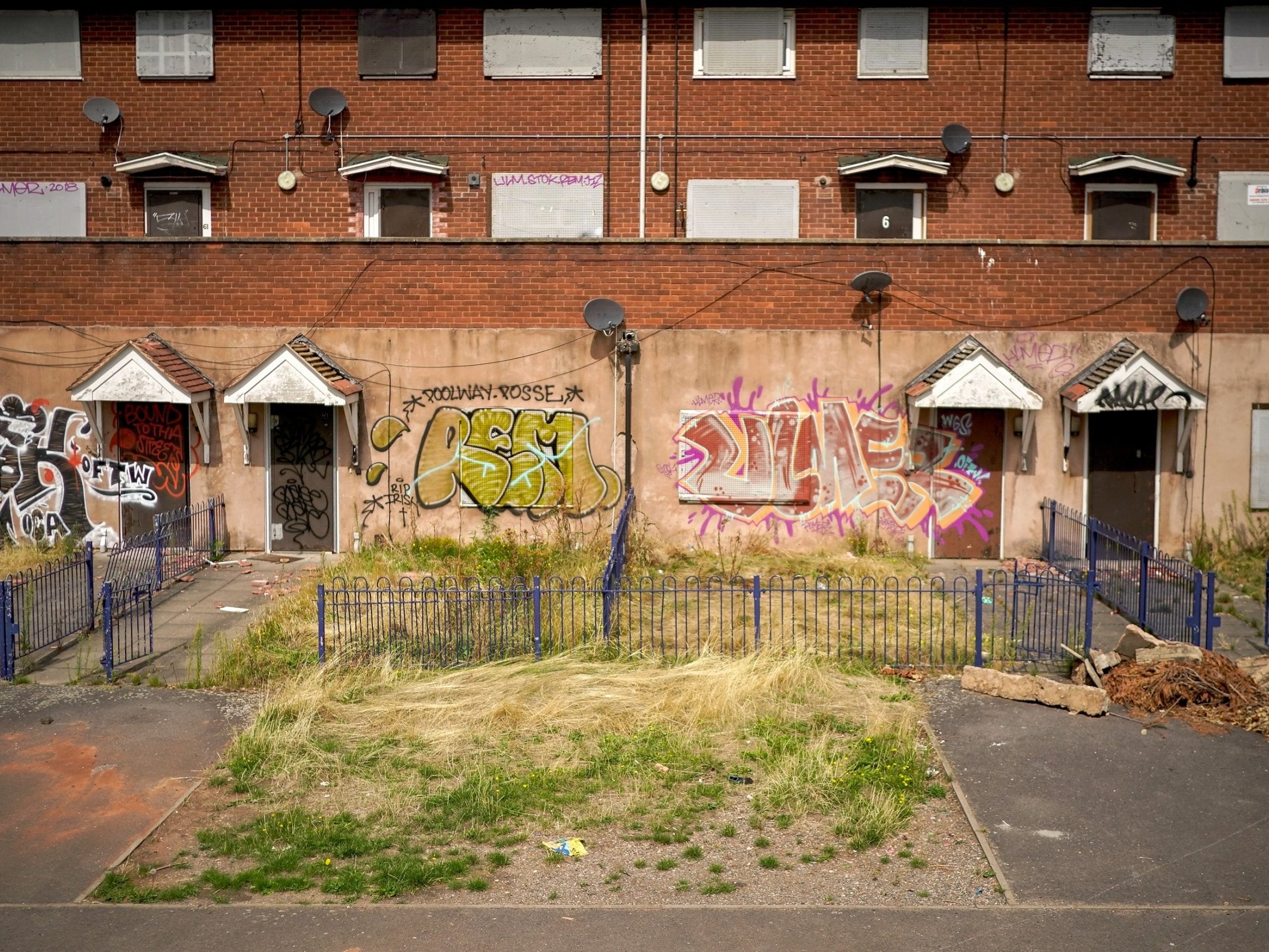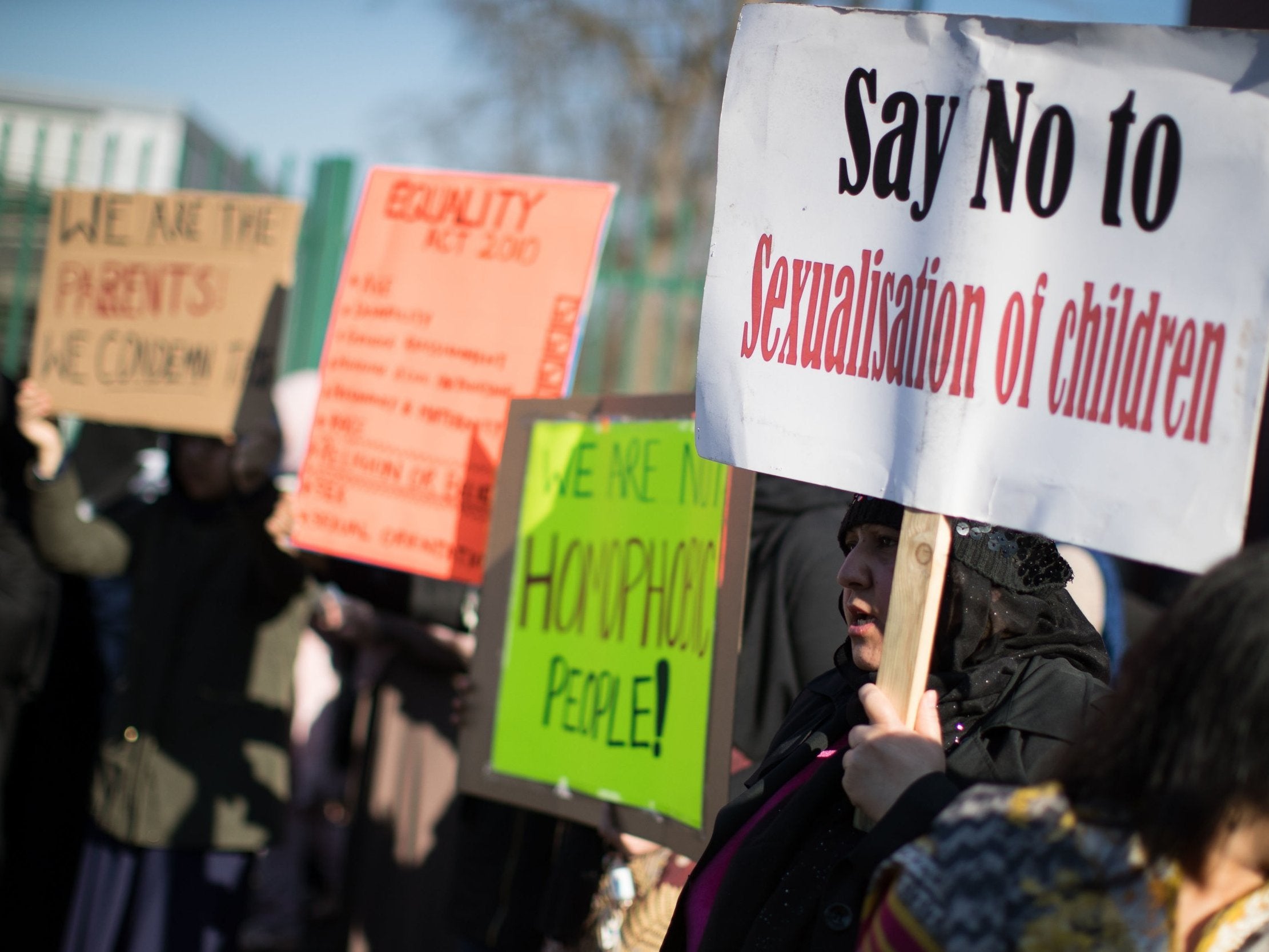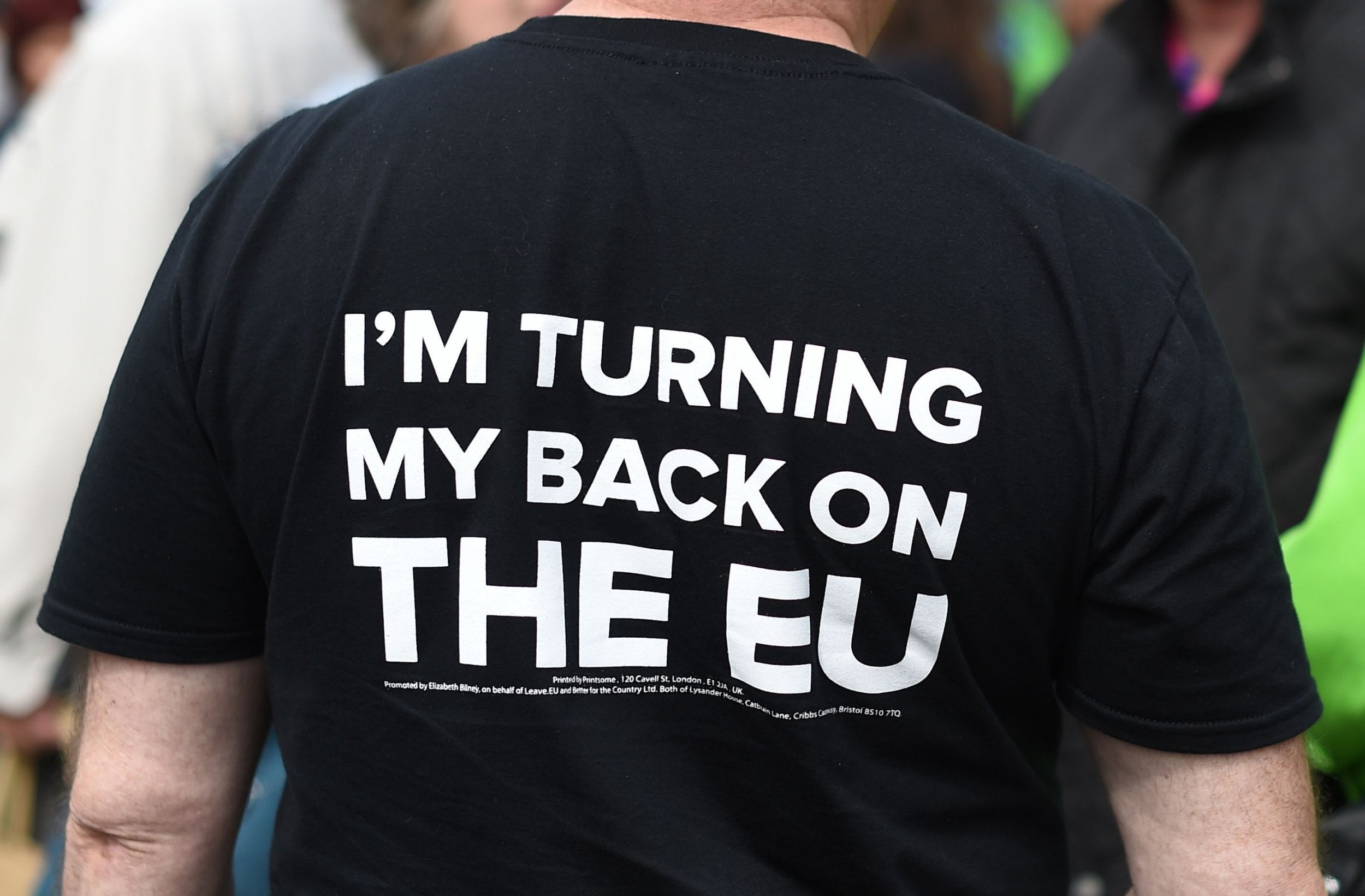In Birmingham, the ‘city of a thousand trades’, Brexit is endangering a modern-day renaissance
England’s second most populous city was revived by EU money but voted to leave the bloc, in a pattern that has become all too familiar, says Patrick Cockburn


Birmingham, once the manufacturing heart of Britain when it was the workshop of the world, rejuvenated itself after the implosion of its industrial base in the 1980s. That collapse, unimpeded by Margaret Thatcher and the Conservative government, was devastating even by the standards of the time because of Birmingham’s over-dependence on the automobile industry.
“This city lost more jobs in less than 10 years than any other part of the UK, including the whole of Scotland and Wales combined,” says Sir Albert Bore, a leading figure on Birmingham City Council. No less than 200,000 positions disappeared and unemployment averaged 25 per cent, climbing to 50 per cent in the worst-hit areas.
“We realised the government was not going to help,” he adds, recalling that the city did not have at that time a single adequate hotel or restaurant in which to house and feed the potential investors it was hoping to attract.
The refusal of the British state to provide funds as a catalyst for revival forced the council to look to Brussels for help in its renaissance.
“The EU made it happen because theirs was the first big investment,” Bore says. Over the following years, the city received huge amounts of funding from the EU.
The effort largely succeeded.
Standing in New Street in the centre of Birmingham, there are cranes at work on the skyline in whatever direction one looks. The city had boasted in the 19th century of being “the city of a thousand trades”, between them supplying the world with whatever merchandise it wanted. But many of these goods were made by a low- or semi-skilled workforce and a technology that was becoming obsolete.
The problems the city wrestled with in the 1980s were the same seen in other urban centres in western Europe and the US, except that in Birmingham’s case the difficulties were worse because of its vast and vulnerable vehicle-making sector. The solutions adopted resembled those elsewhere too: reviving the city centre, attracting high-skilled industries and financial services, creating a highly skilled workforce with an emphasis on expanding higher education.
The 1.1 million population today is younger than any similar city in Europe, largely because there are 80,000 students from the UK and abroad studying at high-prestige institutions such as Aston University, Birmingham City University and Birmingham University, the latter alone employing 10,000 people.
Financial institutions have grown here, such as Deutsche Bank, which once had only a back office in the city but now has a trading floor and employs 1,500 people. New foreign-owned automotive industries like Jaguar Land Rover have moved in or been revived. Against the odds, Birmingham pressed all the right buttons to move towards a high-skilled, high-technology economy operating across the boundaries of many nation states.
Over the past year there have been investment decisions taken by a range of industries that we do not know about, but we will see their impact in five or six years
People who masterminded the transition, however, now wonder if they are about to see Birmingham’s economy once again capsized, this time by the UK’s decision to leave the European Union. Among those most affected by Brexit are those enterprises and institutions which have been the wellsprings of Birmingham’s modern prosperity, uneven though the distributed of its benefits have been.
Success stories that appeared assured are now in question. Will banks like Deutsche Bank and HSBC still be attracted to the same degree as before to Birmingham, or to any other city in the UK for that matter, if their ability to do business with the rest of the EU is curtailed or in doubt? Why should vehicle manufacturers, originally drawn to Britain as a platform to reach 500 million consumers in the EU, find post-Brexit Britain attractive? Will foreign staff and students at the universities be deterred by difficulties over visas, residency, qualifications and, in the case of researchers, a reduction in EU funding?
Bore, credited by many with overseeing the renaissance of the city, believes that the Brexit effect will come in two stages. The short-term one will be (or already is) visible, affecting “just-in-time” deliveries of components, the financial services and all those trading with the EU. But what worries him most is the strategic long-term decisions now being taken by international companies regarding Birmingham that nobody knows about except the decision makers. He warns that “over the past year there have been investment decisions taken by a range of industries that we do not know about, but we will see their impact in five or six years”.
There is likely to be a big difference between large and small companies in their ability to cope with the impact of Brexit. Eddy Moreton, a musician who owns a pub with a music venue in the town of Stourbridge west of Birmingham, says that over the past 15 years he has travelled to cities and towns in Germany, Belgium, Netherlands and Denmark. He believes that leaving the EU will affect small businesses like his much more than big firms
“I used to be able to get in the van and drive to Denmark, earn money, drive back – simple, but I won’t be able to do that anymore and that’s a great loss,” he says.
Supporters of Remain in Birmingham are outraged by what they see as the misinformation, ignorance and xenophobia that typified the EU referendum campaign everywhere.
Jon Bloomfield, a historian and urban policy specialist, is the author of Our City: Migrants and the Making of Modern Birmingham, a highly informed and eloquent account of life in a modern British city during a period of globalisation, austerity and mass migration.
At its core are interviews with 50 migrants, illustrating the diversity of the immigrant communities in Birmingham, but Bloomfield also paints a picture of a city that responded energetically and successfully to the multiple challenges posed by radical economic change.
Bloomfield was horrified by the way the Brexit campaign legitimised xenophobia and racism. He relates how he tried and failed to get Gisela Stuart, the Leave-supporting Labour MP for Birmingham Edgbaston, herself born and raised in Germany, to condemn Boris Johnson for demonising EU political leaders as the heirs of Hitler and Napoleon in trying to create a European superstate.
I know someone who has moved into Northfield from Brixton and they couldn’t get over how white it was, as they had heard how Birmingham is this diverse place - but if you go to the outer city it is just not there.
“My mind almost explodes with rage,” says Bore when he hears the EU being scapegoated for miseries caused by domestically generated economic policies.
“People feel left behind but that’s austerity for you: it drives despair, it drives unemployment. People have to have somebody to blame and they’ve blamed Europe,” he goes on.
Local government in Birmingham is hampered in doing anything to alleviate the deprivation caused by austerity because its budget has been slashed by £750m since 2010 thanks to central government cuts.
Misinformation and austerity explain much, but they cannot explain everything when it comes to analysing why, despite many signs of economic success, Birmingham voted in the 2016 referendum to leave the EU by the slim margin of 50.4 per cent to 49.6. In the west midlands as a whole, the Leave majority was much higher at 59.3 per cent.
Remain voters were aghast and baffled by the outcome, often reacting with derisive cliches about “turkeys voting for Christmas”, given that the economic arguments for staying in the EU seemed to them so overwhelming. The simple answer to this is that the turkeys in question never felt that they had much of a Christmas to celebrate at any time and were never likely to offer endorsement at the ballot box to anybody in charge of the festivities.

The beneficiaries of Birmingham’s well-advertised economic renaissance included only a proportion of its inhabitants, in sharp contrast to the impression given by its bustling multiethnic city centre. Alex Aitken, a 25-year-old care worker and a Labour councillor representing a ward in the Northfield constituency, says that the city’s reputation for ethnic and social diversity is deceptive.
“I know someone who has moved into Northfield from Brixton,” he says, “and they couldn’t get over how white it was, as they had heard how Birmingham is this diverse place with multiple backgrounds, but if you go to the outer city it is just not there.”
Aitkin says that districts in these areas are markedly different from inner-city Birmingham and much more like the northeast of England where there are “those old-school Labour seats that voted Leave”.
The division – essentially between those who benefited from globalisation and those who did not – is the same all over England and Wales. A breakdown of the referendum vote ward by ward in Birmingham shows that three decisive factors are educational qualifications, age and ethnicity. These explain more than 90 per cent of the variation in voting and were a more accurate determinant of voting choice than poverty and social class. The lower the educational level, the higher the number of people voting Leave vote and vice versa.
Martin Rosenbaum, in a study of the ethnic dimension of the Birmingham vote, writes that Shard End ward, which is 82 per cent white, “had the highest Leave vote, at 76 per cent, and the lowest proportion of graduates, at 9 per cent. In contrast, Moseley and King’s Heath ward had the lowest Leave share, at 23 per cent, and consists of 46 percent graduates.” Only in the five wards where migrants are the majority did the less well educated and older voters chose Remain.
Leave voters told pollsters that the priority issues for them were “immigration” and “sovereignty”, in contrast to Remainers who plumped for “the economy”.

In Stourbridge, a town which voted Leave by 68 per cent, Eddy Moreton says that many there are “independent-minded people who work for themselves and see the world through a conservative prism of self-reliance”. He describes the town as being a very white place with few immigrants where xenophobia is common and there is an “I’m all right Jack” attitude.
Many Leave supporters are doing less well than all right. Moreton cites Walsall, where he comes from, “which has had no investment for 40 years since Thatcher destroyed the manufacturing industry. We are now a finance-based economy [in Britain], but there is nothing in it for them and that is what they are revolting against. They don’t care if the GDP goes down because, as the man said, it is not their GDP.”
How far have divisions exposed by the referendum fuelled a real rise in ethnic divisions in Birmingham and elsewhere? Some 44 per cent of the city population are first- or second-generation migrants and they will soon be in the majority.
One needs to downplay a tendency since the referendum to see all toxic developments as somehow caused by the result. There was a widely reported hammer attack on the windows of five mosques in Birmingham in March but police concluded that they were not carried out by far-right extremists and detained a man under the Mental Health Act who handed himself in at a police station. Recent demonstrations in March by Muslim parents over teaching about LGBT+ relationships in primary schools are best explained by the growing conservatism of Muslim communities in Britain and not as collateral damage related to Brexit.
Yet the political atmosphere is definitely becoming hotter and more poisonous. Moreton, who argues for better housing and cost-effective solar energy use in Stourbridge, is worried by a growing intolerance of contrary opinions.
The short-term effect of a Brexit might be less significant than people fear, but the long-term impact – political, social and economic – will most likely be much greater
He and his wife run a pub called the Katie Fitzgerald’s, named after his wife’s mother who came from Cork, though he says that it is not an Irish pub in the traditional sense. They had suspected even before the referendum that Ireland would eventually become an issue in Britain because of the border and this might make them vulnerable because of their Irish sympathies. Sure enough, during the campaign he found himself accused in public of being a supporter of the IRA. Nothing further happened, but he remains anxious because “none of us know how high the political temperature will go” and “many people blame Ireland because they think it stops them having the Brexit they want”.
Above all other anxieties, there is the issue of “immigration”, which all polls and surveys say was the prime and determining issue in the referendum. Leading Brexiteers in parliament seldom speak of it, as if embarrassed by their exploitation of the issue, but it has not gone away or ceased to resonate. For decades the populist end of the mass media has drip-fed readers with stories of immigrants who are “spongers” on the welfare state, though figures show that they draw on it less than the non-immigrant population. The perception of migrants as parasites may be ebbing, but is not going to go away.
Misperceptions are not all on the right. Bloomfield writes that people broadly supportive of immigration underestimate the impact of raw economic competition between different low-income communities for limited opportunities in jobs and housing. He quotes a successful entrepreneur born in China who gave an unsentimental summary of the forces shaping race relations.
“It is much easier to get on if you live in wealthy St John’s Wood or Edgbaston,” he says. “When you have conflict for jobs, for survival, then it’s much harder. It depends what level you are at. If you are facing poverty, good race relations are much harder.”
Overall, the big cities of Europe like Birmingham – Barcelona, Munich and Milan – have done better than national governments in responding to the explosive impact of globalisation. The short-term effect of a Brexit might be less significant than people fear, but the long-term impact – political, social and economic – will most likely be much greater.
Moreton, for instance, fears a slow slide from Britain as a European welfare state to something closer to the free-market American model. “But it won’t happen overnight so people will say the idea is just fearmongering,” he says.
What is undeniable is that Brexit has already produced a crisis that has lasted three years and shows no sign of ending. The rebirth that Birmingham and other British cities once sought pre-Brexit may no longer be attainable in an era of instability and turmoil.
Join our commenting forum
Join thought-provoking conversations, follow other Independent readers and see their replies
Comments